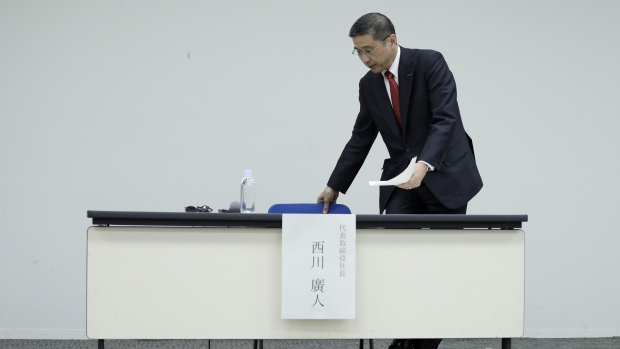Dec 17, 2018
Nissan board holds off picking successor for Ghosn as tensions with Renault brew
, Bloomberg News

Nissan Motor Co.’s (NSANY.PK) board failed to pick a successor for former Chairman Carlos Ghosn, leaving the carmaker without a top official as it enters the fifth week since the car titan’s arrest and faces escalating tensions with partner Renault SA.
The directors convened Monday to chart a path forward following the shock arrest of Ghosn and his removal from the chairman role last month. Instead of choosing a successor, the board focused on establishing a committee to strengthen corporate governance at the carmaker, it said in a statement. Another committee will continue working toward nominating a chairman, Nissan said, without providing a timeline for a decision.
The absence of a chairman means Chief Executive Officer Hiroto Saikawa is very much in charge of steering Nissan through the deepening crisis. Ghosn was arrested in Tokyo on Nov. 19 for alleged understatement of his income, and on Dec. 10 he and the company were indicted by Japanese prosecutors over the suspected misconduct.
The company’s indictment has expanded the scrutiny beyond Ghosn and raised questions about Nissan’s corporate governance. It has also cast attention on the leadership of Saikawa, so much so that his job may even be on the line, according to analysts and people familiar with the situation inside the company.
The arrest has also escalated tensions between Nissan and Renault, whose car alliance — the world’s largest — has been held together by Ghosn for almost two decades. While Renault named an interim replacement following the arrest, Ghosn technically remains the chairman and chief executive officer of the French carmaker while it seeks more information and evidence about the accusations.
PARTNERSHIP IMBALANCE
Nissan has long been unhappy about what it considers an outsized French role in the partnership, and is seeking to redress perceived imbalances, people familiar with the matter have said. In a sign of a deepening divide between the partners, Renault is pushing Nissan to call a shareholder meeting as soon as possible to discuss the Japanese automaker’s indictment, governance and the French company’s appointees on Nissan’s board, people familiar with the matter have said.
Nissan said Monday it will continue efforts to keep its alliance partners fully informed.
Nissan, which Ghosn helped resurrect by uniting it with Renault in an alliance almost two decades ago, conducted a months-long probe into Ghosn’s financial reporting and alleged misuse of company assets. A former Ghosn protege, Saikawa has been Nissan’s CEO since last year and has emerged as a driving force in the investigation.
The timing of the company’s probe prompted some analysts to say the scandal may have been manufactured in order to block a merger that Ghosn was advocating between Nissan and Renault. Saikawa has denied that such a motive was behind the investigation.
Still, Saikawa and other Japanese executives within Nissan have spoken strongly against a merger. A Nissan lifer who was elevated to CEO when Ghosn stepped back from the role last year, Saikawa has a reputation as a fierce defender of Nissan’s interests within its dealings with Renault.
Renault appeared to have been blindsided by Ghosn’s arrest and the allegations that have drifted out. Its executives are suspicious of Nissan’s motives, demanding to see proof from the Japanese carmaker of the accusations against Ghosn, people familiar with the matter have said.
Renault and Nissan have complicated cross-shareholdings, and poor relations would make operations difficult. The French carmaker is the largest shareholder in Nissan and has voting rights, while the Japanese company is the second-largest shareholder in Renault, with no votes. Nissan is keen to achieve a more equal power balance but its demands have been stonewalled by Renault and the French state.
With assistance from Lisa Du




